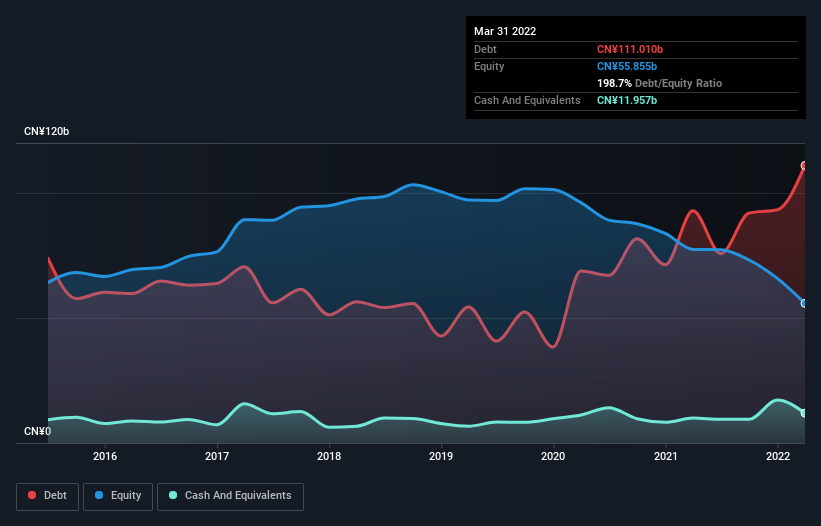Air China (HKG:753) Has Debt But No Earnings; Should You Worry?

Legendary fund manager Li Lu (who Charlie Munger backed) once said, 'The biggest investment risk is not the volatility of prices, but whether you will suffer a permanent loss of capital.' It's only natural to consider a company's balance sheet when you examine how risky it is, since debt is often involved when a business collapses. We can see that Air China Limited (HKG:753) does use debt in its business. But the more important question is: how much risk is that debt creating?
When Is Debt Dangerous?
Debt assists a business until the business has trouble paying it off, either with new capital or with free cash flow. Ultimately, if the company can't fulfill its legal obligations to repay debt, shareholders could walk away with nothing. However, a more frequent (but still costly) occurrence is where a company must issue shares at bargain-basement prices, permanently diluting shareholders, just to shore up its balance sheet. Of course, debt can be an important tool in businesses, particularly capital heavy businesses. The first thing to do when considering how much debt a business uses is to look at its cash and debt together.
See our latest analysis for Air China
What Is Air China's Net Debt?
The image below, which you can click on for greater detail, shows that at March 2022 Air China had debt of CN¥111.0b, up from CN¥92.9b in one year. However, because it has a cash reserve of CN¥12.0b, its net debt is less, at about CN¥99.1b.

How Strong Is Air China's Balance Sheet?
Zooming in on the latest balance sheet data, we can see that Air China had liabilities of CN¥92.9b due within 12 months and liabilities of CN¥144.4b due beyond that. Offsetting these obligations, it had cash of CN¥12.0b as well as receivables valued at CN¥5.03b due within 12 months. So its liabilities outweigh the sum of its cash and (near-term) receivables by CN¥220.3b.
This deficit casts a shadow over the CN¥117.6b company, like a colossus towering over mere mortals. So we'd watch its balance sheet closely, without a doubt. After all, Air China would likely require a major re-capitalisation if it had to pay its creditors today. When analysing debt levels, the balance sheet is the obvious place to start. But ultimately the future profitability of the business will decide if Air China can strengthen its balance sheet over time. So if you want to see what the professionals think, you might find this free report on analyst profit forecasts to be interesting.
In the last year Air China wasn't profitable at an EBIT level, but managed to grow its revenue by 9.0%, to CN¥73b. We usually like to see faster growth from unprofitable companies, but each to their own.
Caveat Emptor
Importantly, Air China had an earnings before interest and tax (EBIT) loss over the last year. Its EBIT loss was a whopping CN¥20b. Considering that alongside the liabilities mentioned above make us nervous about the company. It would need to improve its operations quickly for us to be interested in it. Not least because it had negative free cash flow of CN¥496m over the last twelve months. So suffice it to say we consider the stock to be risky. The balance sheet is clearly the area to focus on when you are analysing debt. However, not all investment risk resides within the balance sheet - far from it. For example - Air China has 1 warning sign we think you should be aware of.
Of course, if you're the type of investor who prefers buying stocks without the burden of debt, then don't hesitate to discover our exclusive list of net cash growth stocks, today.
New: Manage All Your Stock Portfolios in One Place
We've created the ultimate portfolio companion for stock investors, and it's free.
• Connect an unlimited number of Portfolios and see your total in one currency
• Be alerted to new Warning Signs or Risks via email or mobile
• Track the Fair Value of your stocks
Have feedback on this article? Concerned about the content? Get in touch with us directly. Alternatively, email editorial-team (at) simplywallst.com.
This article by Simply Wall St is general in nature. We provide commentary based on historical data and analyst forecasts only using an unbiased methodology and our articles are not intended to be financial advice. It does not constitute a recommendation to buy or sell any stock, and does not take account of your objectives, or your financial situation. We aim to bring you long-term focused analysis driven by fundamental data. Note that our analysis may not factor in the latest price-sensitive company announcements or qualitative material. Simply Wall St has no position in any stocks mentioned.
About SEHK:753
Air China
Provides air passenger, air cargo, and airline-related services in Mainland China, Hong Kong, Macau, Taiwan, and internationally.
Undervalued with reasonable growth potential.

